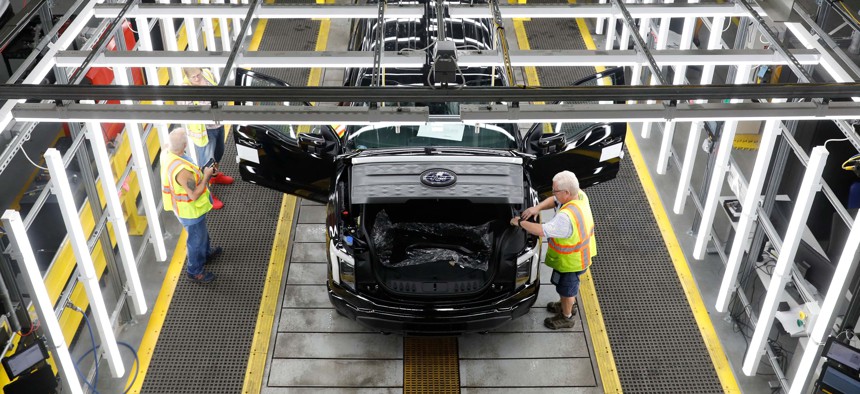The States Gaining the Most Clean Energy Jobs

Ford Motor Co. battery powered F-150 Lightning trucks under production at their Rouge Electric Vehicle Center in Dearborn, Michigan on Sept. 20, 2022. JEFF KOWALSKY/AFP via Getty Images
A new analysis finds companies have announced more than 100,000 positions in fields like solar and wind power and battery-making since Democrats pushed through a massive climate law.
Clean energy companies have revealed plans for about 101,000 new jobs since President Biden signed a law last year that includes billions of dollars of initiatives geared toward promoting renewable energy and cutting carbon emissions.
That's according to a new report from Climate Power, a group that advocates for policies to combat climate change. To come up with its figures, Climate Power looked at public announcements about jobs in clean energy fields between August of last year and the end of January. Jobs identified in the research are spread across 31 states and are tied to 94 new clean energy projects that total nearly $90 billion.
Projects are within sectors such as solar, wind and hydrogen power, battery and electric vehicle manufacturing and other "clean tech."
States with the highest job-counts in the analysis include: Kansas (20,500), Georgia (16,627) and Tennessee (11,753). The group found that 49 of the projects it highlighted are in seven states: Arizona, Georgia, Michigan, Ohio, South Carolina, Tennessee and Texas.
Companies are planning on 40 new battery manufacturing sites, according to the report. It notes one in Kansas where Panasonic intends to build a $4 billion facility to make batteries for Tesla electric vehicles. The group also describes a "Battery Belt" region is emerging in a swath of states stretching from Michigan to Georgia.
“This is only the beginning," Lori Lodes, Climate Power's executive director said in a statement.
"We’re already at the precipice of a renewed manufacturing, Made in America boom that will create opportunities for millions of Americans," she added.
Democrats' Inflation Reduction Act directs around $390 billion in federal tax breaks, grants and financing assistance toward a range of climate, environmental and manufacturing programs.
The law aims to reduce emissions that are driving global warming, which is contributing to natural disasters and other environmental problems, like flooding, wildfires, drought, extreme heat, and the extinction of plants and animals. But the legislation also amounts to a major industrial development policy, particularly given its emphasis on strengthening U.S. manufacturing and domestic supply chains.






